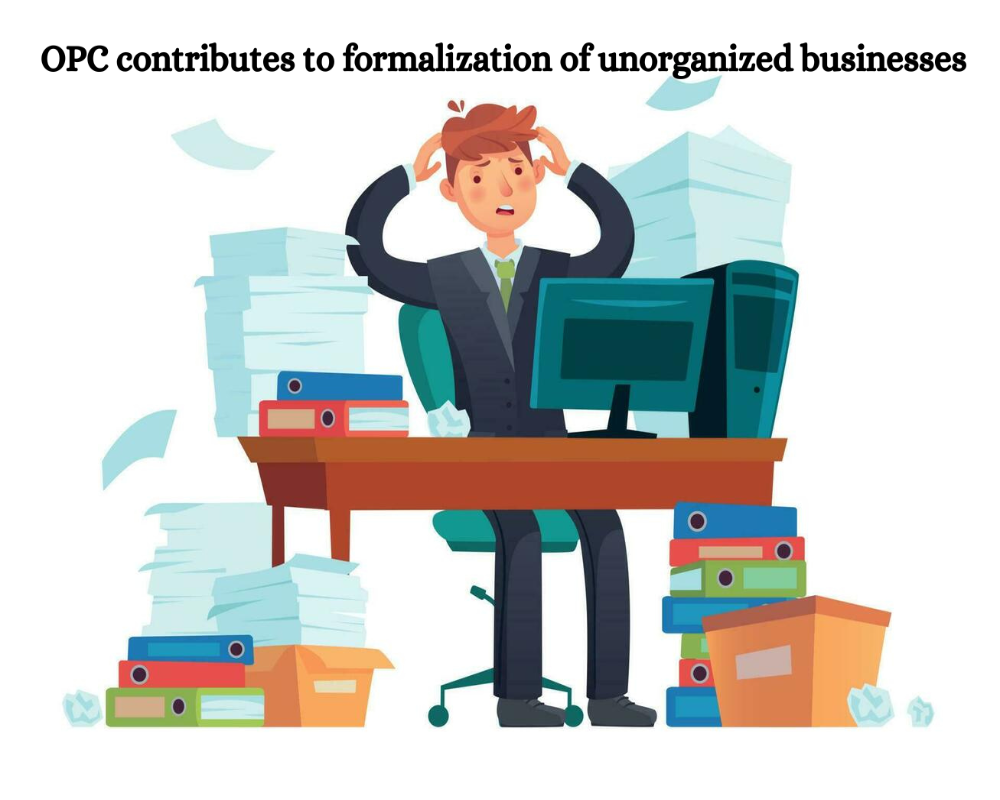Introduction
India’s economy has long been characterized by a large unorganized sector comprising informal businesses operating without legal registration or structured governance. These enterprises, though significant in employment and local commerce, often lack access to financial services, legal protection, and growth opportunities. The introduction of the One Person Company (OPC) structure under the Companies Act, 2013 was a strategic move to bring such individual-led businesses into the formal economy. OPCs serve as a bridge between informal entrepreneurship and structured corporate governance. This article explores how OPCs contribute meaningfully to the formalization of unorganized businesses.
Offering a Legal Identity to Solo Entrepreneurs
One of the most important contributions of OPCs is providing a legal corporate identity to individual entrepreneurs. Previously, individuals running small businesses operated as sole proprietors with no distinct recognition under law. By registering as an OPC, these entrepreneurs gain a formal status that enhances their credibility in the eyes of clients, banks, and government bodies.
Simplified Incorporation Process
OPC formation has been made user-friendly through online incorporation using the SPICe+ form on the Ministry of Corporate Affairs portal. This ease of registration encourages informal businesses to transition into the formal sector. Unlike traditional companies, OPCs require only one person, eliminating the need for partners or shareholders at the time of incorporation.
Access to Financial Services and Credit
Unorganized businesses often face difficulties in accessing formal credit due to lack of documentation and legal recognition. OPC registration allows businesses to obtain a Permanent Account Number (PAN), open a bank account, and apply for business loans or credit facilities. This access to financial services is essential for scaling operations and improving cash flow.
Limited Liability Encourages Risk-Taking
Sole proprietors often avoid formalization due to fear of unlimited personal liability. OPCs address this by offering limited liability protection, where the personal assets of the owner are safeguarded from business debts. This safety net encourages more entrepreneurs to formalize their business while taking calculated risks without fear of personal financial ruin.
Promoting Tax Compliance and Transparency
Formal registration as an OPC brings the business under the ambit of Income Tax and Goods and Services Tax (GST) regulations. This leads to better record-keeping, timely filing of returns, and increased tax compliance. Over time, this builds a history of compliance that is useful for audits, funding, and business credibility.
Facilitating Government Registrations and Incentives
Many government schemes and subsidies for micro, small, and medium enterprises (MSMEs) require proof of legal existence. OPCs, being registered companies, can easily obtain Udyam Registration, Digital MSME certifications, and Startup India recognition, enabling them to participate in tenders, claim subsidies, and access training and infrastructure programs.
Ensuring Business Continuity through Nominee Provision
In unorganized setups, the death or incapacity of the business owner often results in business closure. In contrast, OPCs require the appointment of a nominee, who takes over the company if the owner is no longer able to manage it. This provision ensures business continuity, safeguarding employees, creditors, and customers from sudden disruptions.
Encouraging Transition to Larger Corporate Structures
Once an OPC grows and exceeds the prescribed thresholds of turnover or capital, it must convert into a private limited company. This transition introduces the business to more robust governance practices, a wider ownership structure, and enhanced investment opportunities. Thus, OPCs act as stepping stones from the informal to the organized and eventually to the corporate sector.
Conclusion
The One Person Company model plays a transformative role in the formalization of unorganized businesses in India. By offering a legally recognized, single-owner corporate structure with compliance benefits and financial safeguards, OPCs provide a viable alternative to informal setups. They facilitate access to credit, encourage tax compliance, and enable participation in the broader economic ecosystem. For individual entrepreneurs looking to grow sustainably, OPCs represent the first step toward integration into the formal economy and long-term business development.
Hashtags
#OPC #UnorganizedBusiness #BusinessFormalization #Entrepreneurship #SmallBusiness #StartupIndia #BusinessGrowth #LegalCompliance #BusinessStructure #FinancialInclusion #MicroEntrepreneurs #BusinessDevelopment #SelfEmployment #BusinessSupport #EconomicEmpowerment #FormalBusiness #BusinessRegistration #EntrepreneurSupport #BusinessInnovation #InclusiveEconomy


0 Comments